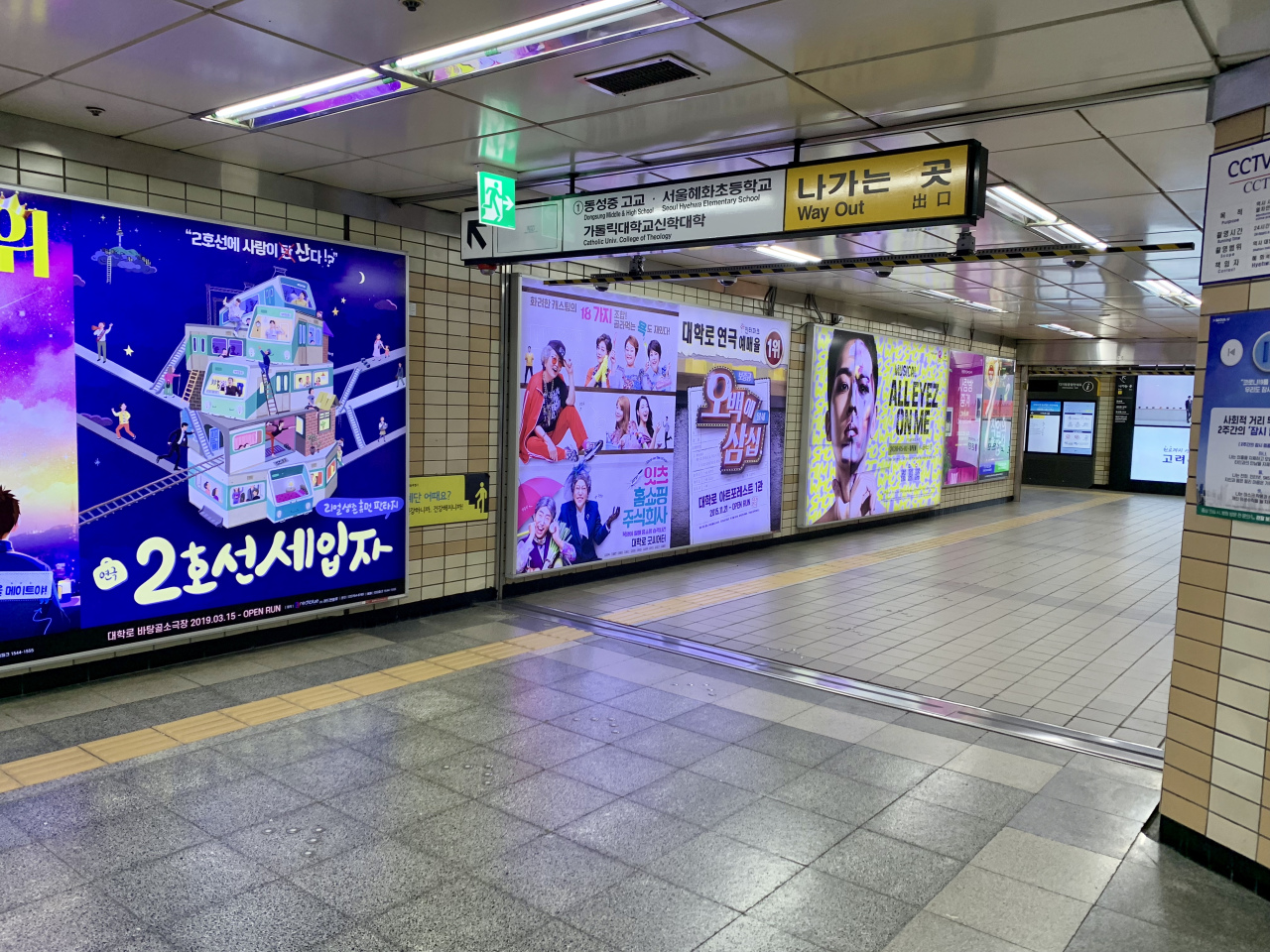Lights go out at Daehangno
Small theaters struggle to survive amid COVID-19 pandemic
By Im Eun-byelPublished : April 14, 2020 - 14:31
Daehangno, an area of Seoul that is home to numerous small theaters, has been hit hard by the ongoing COVID-19 outbreak as theaters have been shut down in compliance with the government’s social distancing program.
The Korea Performing Arts Box Office Information System, managed by the Korea Arts Management Service affiliated with the Ministry of Culture, Sports and Tourism, showed a sharp drop in ticket sales following the outbreak of the virus.
The Korea Performing Arts Box Office Information System, managed by the Korea Arts Management Service affiliated with the Ministry of Culture, Sports and Tourism, showed a sharp drop in ticket sales following the outbreak of the virus.


According to the data, ticket sales dropped to 4.57 billion won ($3.74 million) in March. In February and January, the figures stood at 19 billion won and 39 billion won, respectively.
Reflecting the numbers, the streets of Daehangno were mostly empty on Thursday afternoon. An area that used to bustle with college students had far fewer people on the streets.
There were only a few people handing out pamphlets promoting shows, as some popular plays have temporarily shut down. Ticket information booths were shuttered, and a poster stated that the plays had closed to comply with the government’s social distancing guidelines.
Social distancing for theaters
On March 27, after Korea was hit hard by the pandemic in mid-February, the Seoul Metropolitan Government sent official notices to small theaters, detailing the six guidelines to prevent the virus from spreading.
Though the guidelines were simple instructions, including body temperature checks, use of hand sanitizer, wearing masks, disinfection and making a list of attendees with contact information, a clause mandated that a distance of 2 meters must be maintained between audience members and between the stage and the first row.
For many small theaters, however, the guidelines are almost impossible to comply with as each seat is only about 50 centimeters wide. Two seats would have to be left vacant between audience members and a number of rows in the front would have to be left unoccupied, too.
“We, of course, agree with the social distancing policy. But to comply with the Seoul Metropolitan Government’s guidelines, some theaters can only hold up to 10 audience members,” Choi Yoon-woo, chief director of the Korea Small Theater Association, told The Korea Herald.
“The Seoul Metropolitan Government now acknowledges small theaters are trying to maintain social distances as much as possible. A seat is left empty between two audience members, while the venue occupancy is at 40 percent.”
But as Choi pointed out, regardless of the guidelines, people are unwilling to come to theaters at a time like this. “No one comes to the theaters, except for industry figures or those who are related to the productions,” Choi said.
Fear prevails
Earlier this month, two cast members of the world tour production of musical “The Phantom of the Opera” were confirmed to have the coronavirus. The rest of the 128-member team tested negative, but 8,578 people who attended the musical are currently under the monitoring of the Seoul Metropolitan Government.
Following the report, other musical productions shut down temporarily as a precaution. The suspension of musical performances is affecting the small theater scene, too.
“As theaters are controlled environments, I thought watching plays was fine even after the outbreak in mid-February,” Ahn Ji-young, an office worker in Seoul, said. Ahn is a regular theatergoer.
“I used to be a fan of the local small theater scene, appreciating the intimate interaction between the cast and the audience. But not anymore. That intimacy now means there may be more chances of infection.”
Even, “Boeing-Boeing,” one of the longest running plays in Daehangno, suspended performances in late February. The comedy show began its run in the area in 2001 and has been a bestseller.

“Please save Daehangno,” Son Nam-mok, head producer of the show, wrote on his social media account after the show was suspended. Around 200 small theaters in Daehangno are on the verge of bankruptcy due to the viral outbreak, he wrote.
Supporting the industry
In mid-March, the government came up with measures to support the theater scene.
Discount tickets, production cost support and emergency loans were announced by the Ministry of Culture, Sports and Tourism. The Seoul Foundation for Arts and Culture, under the Seoul Metropolitan Government, is to fund 500 artists with a 4.5 billion won budget.
However, the support measures may not be enough to rescue the small theaters on the brink.
“The government measures are focused on funding productions. But we have been unable to perform for more than three months. Even in May and June, things will not be the same. The latter half of the year is unpredictable,” Choi said.
“The government needs to come up with measures that can cover the loss that originated from February, to support the troupes and actors who relly suffered losses,” he said.
“Some say theaters should all be shut down to prevent the virus from spreading. But for us, this is about making a living.”
By Im Eun-byel (silverstar@heraldcorp.com)








![[KH Explains] Hyundai's full hybrid edge to pay off amid slow transition to pure EVs](http://res.heraldm.com/phpwas/restmb_idxmake.php?idx=644&simg=/content/image/2024/04/18/20240418050645_0.jpg&u=20240419100350)







![[From the Scene] Monks, Buddhists hail return of remains of Buddhas](http://res.heraldm.com/phpwas/restmb_idxmake.php?idx=652&simg=/content/image/2024/04/19/20240419050617_0.jpg&u=20240419175937)

![[KH Explains] Hyundai's full hybrid edge to pay off amid slow transition to pure EVs](http://res.heraldm.com/phpwas/restmb_idxmake.php?idx=652&simg=/content/image/2024/04/18/20240418050645_0.jpg&u=20240419100350)

![[Today’s K-pop] Illit drops debut single remix](http://res.heraldm.com/phpwas/restmb_idxmake.php?idx=642&simg=/content/image/2024/04/19/20240419050612_0.jpg&u=)